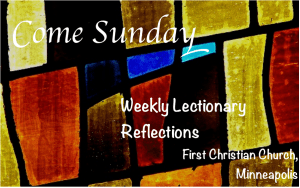Sixteenth Sunday of Pentecost (Year C)
September 8, 2013
Luke 14:25-33
One day when large groups of people were walking along with him, Jesus turned and told them, “Anyone who comes to me but refuses to let go of father, mother, spouse, children, brothers, sisters—yes, even one’s own self!—can’t be my disciple. Anyone who won’t shoulder his own cross and follow behind me can’t be my disciple.
–Luke 14:25-27 (The Message)
 On September 8, 2002, I was ordained a minister in the Christian Church (Disciples of Christ). As I reflect on eleven years in ministry, I’ve noticed something: every ministerial position I’ve had has been part-time. I spent the last five years as part-time Associate Pastor in Minneapolis, and this Sunday I begin as the Supply Pastor of a church northeast of St. Paul.
On September 8, 2002, I was ordained a minister in the Christian Church (Disciples of Christ). As I reflect on eleven years in ministry, I’ve noticed something: every ministerial position I’ve had has been part-time. I spent the last five years as part-time Associate Pastor in Minneapolis, and this Sunday I begin as the Supply Pastor of a church northeast of St. Paul.
I actutally like working part-time. In most cases, the churches couldn’t fund a full time position, which is was okay by me. I was still able to do ministry, though it was far more limited than what could be done as a full-time pastor.
When you’re a part-time clergyperson, especially if you have another job, you have to learn how to manage your time. Since we only have 24 hours in the day, I have to decide what is most important to get done. Somehow, I’ve managed to pull it off. That said, being part-time with another job means that you aren’t always focused. You have to deal with two things vying for attention which can weaken your committment to both.
In the gospel lesson for today, we see Jesus telling the crowds that to be a disciple, a follower of Jesus, they need to “hate” their families and even their own lives. That’s a harsh statement to hear. How many of us want to tell off our relatives? We don’t like this passage (well, at least I don’t like it) because it’s so black and white. There’s no room for a part-time lover; you’re either all in or you’re not.
I wonder though if we are looking at the text wrong. What if Jesus isn’t calling us to hate our mothers and fathers and siblings, but is calling us to place everything, including our families under the lordship of Jesus. What if Jesus is saying that to be a follower means that every aspect of our lives is given over to God?
The late Dallas Willard wrote about this passage. He thought this was less about some kind of drugery, where we have to give up things we love and instead “count the cost” in a spirit of joy:
So this counting of the cost is not a moaning and groaning session. “Oh how terrible it is that I have to value all of my ‘wonderful’ things (which are probably making life miserable and hopeless anyway) less than I do living in the kingdom! How terrible that I must be prepared actually to surrender them should that be called for!” The counting of the cost is to bring us to the point of clarity and decisiveness. It is to help us to see. Counting the cost is precisely what the persons with the pearl and the hidden treasure did. Out of it came their decisiveness and joy. It is decisiveness and joy that are the outcomes of the counting.
What this passage in Luke is about is clarity. It is not about misery or about some incredibly dreadful price that one must pay to be Jesus’ apprentice. There is no such thing as a dreadful price for the “pearl” in question. Suffering for him is actually something we rejoice to be counted worthy of (Acts 5:41; Phil. 1:29). The point is simply that unless we clearly see the superiority of what we receive as his students over every other thing that might be valued, we cannot succeed in our discipleship to him. We will not be able to do the things required to learn his lessons and move ever deeper into a life that is his kingdom.
Of course, if we are holding on to our dear lives, we won’t want to give anything out of joy. But what if we loosen our grip and start to see how God works in every nook and cranny of our lives. Not just when it comes to religious matters, but in our work, our play and our relationships. As Willard notes, this passage is really about clarity. It’s that experience of dizzyness we get when we wear a new pair of glasses. Everything looks the same, but everything is different now.
Jesus does want it all. But I don’t think this is about some kind lenten abstinence writ large. No, it’s more like having second sight and seeing things in a different way. It’s learning how even the most mundane aspects of life are given over to God.
None of this is to say that there aren’t times when we do have to make a clean break. But more often than not, it’s understanding that this is God’s world and we are God’s servants, ready to see what God would have us to in God’s world.
Jesus isn’t looking for a part-time Christian, but full-time disciples.
And the benefits aren’t that bad.
Go and be church.



